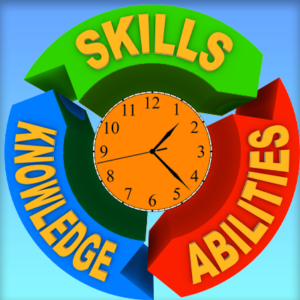Professional Has The Answer To Everything
Professional refers to anyone capable of earning a living from performing activities that need a certain level of skill, education, and training. Amazingly, many professionals often offer solutions to problems facing the world. Through the expertise of the professionals, it is easy to agree that professional has the answers to everything. Professionals aren’t a liability to themselves alone but to other people as well. For a better insight on how a professional has the answers to everything and how to become a professional, consider the following.
- Why knowing your strength is important.
- Think about the abilities that have helped you thrive.
- Activities and abilities that make you feel empowered.
- What comes to you naturally?

Importance of knowing your strengths
# You Can Do Importance Of Knowing Your Strengths Almost Instantly Here»Knowing your strengths is crucial especially in giving you a better understanding of yourself and how you can function properly. When you understand strengths, it puts ahead in many things like easier selection of a career path. It also enables you to grow more since it’s easier to excel and aim higher in areas of your strength. However, weakness may play in an attempt to help you understand things holding you back, but try putting your focus on your strengths.
Strengths are often referred to as actions you can do well. These include knowledge, skills, talents, and proficiencies. It is significant to realize that your strengths are the value you bring to the world for you to lead. However, knowing your strengths can be challenging to some but if you take some time and think about what comes to you naturally, then you will know. For instance, you have no problem conversing with people you meet o the first time, or you can think of viable solutions in a tense environment. Knowing both your strengths and weaknesses, things that hold you back from achieving great things, is essential for self-development and personal growth.

Thinking about abilities that have helped you thrive
# The Abilities That Have Helped You Thrive Here»It can be easier to hold down a job to most people without putting much thought into the process. However, there is a huge difference between surviving within the job, and thriving in your career. To strive for success within your industry, always think about how to apply abilities like innovative thinking to find yourself a place in a selected business sector. In case you are uncertain of the techniques that can help you thrive in your career, here are some that can help you obtain greater achievements.
A common mistake that most people make is becoming stuck in a mindset of working traditionally. It is easier for people to create habits or patterns that they follow, this creates reluctance in moving forward alongside your industry. To move forward with your career, be willing to move with the times and be adaptable. The changes may be organizational, creative, personal, or technological. Whenever you feel that there isn’t constant learning in your job role, then it’s likely you are falling behind.

A competitive nature
# How To Deal With A Very Bad A Competitive Nature Here»Success can only come about when you go out and get it yourself, it’s rare to have it handed over. Forming friendships with your colleagues is perfectly fine, but this should not distract you from your competitive nature. It is crucial to have healthy competition since too much rivalry can be detrimental to the working environment. However, competitiveness without a set goal is a waste of energy, it is best to set new targets.
A competent leader is someone to who their team can look up to and turn to during times of need. It takes more to be able to lead a group than to give orders to the members. Abilities such as communication are crucial in helping a leader to efficiently work with other workers, and the capacity to deputy is basic in leading a team to success. However, some leadership abilities come naturally and others may require undergoing a course. To thrive in your career, you need to exhibit leadership skills.
 Willingness to take on risks
Willingness to take on risks
It’s hard to avoid risks within a business, but doing nothing at all is the biggest risk you can take. Being willing to put everything on the line to be successful may make you thrive. You must be ready to take calculated gambles for the opportunities that they may offer you. This may include starting new projects with the understanding that both the failures and successes of the ventures would be attributed entirely to you.
- Dedicated. Professionals stay committed to business values and models even when other participants are crying wolf, complaining about the market, or blaming the world for their career shortfalls. Sometimes he/she may lose a potential client because the client’s perception contradicts business morals or practices. Successful professionals learn how to hang in there even in tough times. They learn from pasted mistakes and errors made by others in the industry. A professional use information appropriately to create action plans to improve their operation.
- Approachable and Willing to Learn. Art professionals need to be approachable and willing to learn to advance in this evolving industry. Always leave the ego at home and be open to respectful discussions. Knowing where he/she needs improvement and being available to advise from others will help a professional grow his/her business over time. Remember, the art market is an array of vital information; eat your fill, then go back for more.
- Creative Thinkers: An art professional must have the ability to think outside the box is crucial. Thinking creatively also helps identify opportunities that others will overlook. Convert negative marketplace perceptions into productive solutions. Know what information is valuable and what is not is a trait of Art professional.
- Communicator: While art professionals don’t have to be polished public speakers, art professionals need to be excellent listeners, talkers, and contributors. Communication skills are imperative to facilitate a meaningful discussion, negotiate great opportunities and develop a productive network of stakeholders.
- Learn how to read people. As a professional, he/she must identify when somebody is trying to give them the runaround. Building the observation skill will eliminate a lot of time wasted on potential tire kickers. It will keep the professional attention focused on their clients’ opportunities and advance the professional business model.
- Great at Networking. Finding qualified clients, locking in significant opportunities, and advancing your client’s endeavors, becomes much easier when a professional knows the right people in Art’s community. As an art professional, it is essential to meet people in all sectors of the art world. Spending time with movers and influencers yields a higher return than with creatives in general. Most opportunities in the Art’s never make it into the local echo chamber. Developing a quality relationship is more important than quantity. A great way to start networking is through professional groups, attending major trade events, and collaborating with other professionals who work in the trenches.
- Willing to take Risks. When managing artist careers, promoting new art products, advising creatives, facilitating the acquisition of blue-chip art assets, or consulting art business owners, there is always a risk to a professional reputation, brand, and future earning capacity. A professional needs to know his/her personal and professional degree of risk tolerance. Successful art professionals learn to recognize risk and manage it well by creating a comprehensive plan of operation with solid exit strategies — can help offset most risk.
- A niche for strategizing. A professional must be a problem solver and an “art” market strategist. Understanding opportunities during periods of confusion, forge solutions from complaints, and sculpting success out of failure is a critical trait for long-term success.
Activities or abilities that make you feel empowered
Empowerment means controlling your environment and using your abilities and talents towards benefiting you and your organization. Amazingly, focusing on your empowerment can result in greater responsibilities and long-term success in your career. Here are some of the activities that will help you feel empowered.
- Finding a mentor; working with a mentor can be crucial in helping you achieve personal career goals, including increased empowerment at work. It’s ideal to get a mentor who works in your industry or the industry you want to be employed in someday. Ask for honest feedback from them and areas of improvement.
- Asking for consistent feedback; asking your peers and superiors for feedback to get a holistic view of your performance. It can be helpful, especially in personal growth by understanding your strengths and weaknesses. By doing this, you will feel empowered.
- Communicating with your supervisor; supervisors or managers act as your advocates since they are responsible for your performance. Speaking to them about your desire to get empowered as an employee and discuss ways to make that happen. Once you feel empowered at the workplace, you will labor effectively toward your own goals.

What comes to you naturally?
# What comes to you naturally Here»Something that comes naturally to you is often something that you are best at, like a talent. However, knowing you do naturally is different from putting yourself in place to use your talent. Generally, strengths can also naturally come and you can use the same criteria of identifying strengths for talents. In case you still find it hard to know what naturally comes, try asking someone close to you including teachers, friends, and family members. It’s important to find the right niche by yourself instead of letting others do it for you. This will help in shaping your future and show your value to the world.
In short, people have different strengths and weaknesses, knowing your strength is crucial in career selection. Professional can be said to be the answer to everything because of the accuracy, competency, and the way professionals deal with issues. A combination of talent and professionalism can yield the best outcome in any field. In case you haven’t found your strength, please do, especially if you want to succeed in your career.

